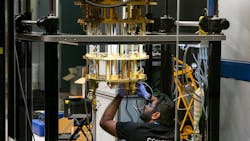CP Notebook: A Quantum Leap for Chemical Industry R&D?
The chemical industry is among the top sectors poised to leverage the power of quantum computing, industrial market research firm IDTechEx reported in a new study.
The technology shows the most immediate promise for use in chemistry and materials science simulations, according to the study. The developments could lead to new chemicals, materials and pharmaceuticals.
IDTechEx predicts the global commercial opportunity for quantum computing hardware will surpass $21 billion within the next 20 years.
Traditional, or “classical computing,” that consumers are familiar with from their home computers and electronic devices store data as either ones or zeroes. Quantum computers use qubits, which can store both zeros and ones in any combination at the same time. This means quantum computers can process several equations simultaneously, leading to exponentially faster processing rates.
With multiple hardware providers demonstrating products capable of high-fidelity operations with hundreds of qubits, the market focus is now shifting to which industries will be the first to benefit from commercially ready quantum computers, according to IDTechEx.
Major chemical manufacturers have begun exploring the potential of quantum computing with BASF and Covestro showing interest in the technology. BASF has already partnered with several companies in the quantum space, including Kipu Quantum on logistics optimization and NVIDIA on prediction properties of chelating agents. Covestro is collaborating with Google to develop and test error-mitigation techniques that improve the accuracy of quantum computer simulations for industrial chemistry research and chemical reactions.
Noah El Alami, a technology analyst with IDTechEx, discussed the promise of quantum computing and its relevance in the chemical industry shortly after releasing the report. The following is an edited version of that conversation.
CP: How do you foresee the chemical industry benefiting from quantum computing?
El Alami: The earliest advantage that I've already seen a few players publish some evidence for is in magnetic systems. Magnetic systems generally get very complex very quickly. It's a problem that becomes hard to compute with a classical computer because all these magnetic spins interact with each other. It becomes very nonlinear very quickly. And then there’s a lot of interest in the pharmaceutical industry, where there's the potential for drug discovery.
One potential application is in the area of high-temperature superconductors, where the goal is to build extremely powerful magnets using high-temperature superconducting materials. That's where simulations of those magnetic materials are very important (modeling large, powerful, complex magnets). The next one would be from automotive. The main push is for new battery chemistries or battery materials for energy storage. In aerospace, there’s interest in advanced materials with certain properties that might not be currently available on the market. And then there’s interest and investment in the chemical industry, including petrochemicals, in quantum computing. Research has shown promise in industrial chemistry, solutions chemistry and material-science applications.
CP: Where are we at today with quantum computing? Are there chemical processing companies deploying these systems, or is it too early right now?
El Alami: I think it's mainly in the use-case development stage at the moment. That means large chemical companies will definitely be exploring and have some access to quantum computing systems, whether that's through a supercomputing center they're partnered with or otherwise through a cloud platform. So, like cloud services for AI tools, you can access quantum computers via the cloud — quantum as a service. A lot of chemicals materials companies will be using these cloud services or connecting directly with a supercomputing center, maybe in their country that has a quantum computer on site.
CP: What does quantum computing require from an infrastructure perspective?
El Alami: It really depends on the deployment business model. There’s a lot of new infrastructure that has to go into place for quantum computers. The primary one is that most types of quantum computers require some kind of cryogenic cooling. And that is not a very familiar infrastructure demand for the computing industry. Thermal management is a big deal for data centers and for traditional computing, but not with cryogenics. So, there is an infrastructure demand.
But the question is, who has to shoulder that burden? In the near future, or at least the next decade, we're likely to see most commercially available quantum computers stay in high-performance computing centers or maybe data-center facilities, versus being deployed on premises with the actual end user, or chemical company, unless it's a very large chemical company that has its own dedicated data center for all of its computing needs. I think, generally, quantum computing will be outsourced to somewhere like a data center facility, so that infrastructure burden will not be shouldered by that company.
CP: The IDTechEx report mentioned cybersecurity concerns as a challenge. Can you talk about that?
El Alami: It comes back to this idea of changing the complexity of problems. At the moment, a lot of digital data is encrypted through algorithms, which are very hard for a classical computer to crack. They keep data encrypted. But because quantum computers can approach these problems differently, there are certain cryptographic algorithms they can potentially break very quickly. Quantum computers today aren't capable of doing this, but a quantum computer that we build in maybe the next five to 10 years could be powerful enough to break the cryptographic algorithms that a lot of governments use and a lot of big corporations use to protect sensitive data.
What we're finding is that a lot of organizations don't want to take this risk that their data is going to be hacked and decrypted in the future and exploited. But this isn't an unavoidable problem. One approach to protecting data from cybersecurity breaches by quantum computers is called post-quantum cryptography (PQC). It was catalyzed recently by the National Institute of Standards and Technology, which released a set of PQC standards in August 2024 after a contest that lasted several years.
The benefit of this approach is that new software is generally easier to implement than new hardware, although this migration to PQC encryption algorithms is still anticipated to take years.
The main counterargument is that even these new algorithms aren’t guaranteed to be safe from quantum cracking forever; they’re just a lot safer than what we use currently. That’s why hardware-based security solutions such as quantum key distribution are also being explored.
CP: Where do you see the quantum computing market in the future?
El Alami: By the end of this decade, hopefully before 2030, is where I'd expect to see the first quantum hardware come online that can tackle some of those very specific [use cases]. I think at this stage, 2029 is when I would expect to see real commercial value created by quantum computers. As for how that compares to AI or machine learning, I think we're kind of all seeing how that rollout of machine learning and AI is still going.
At the moment, I think a big difference between quantum computing and AI is that quantum computing will remain a deep tech. I don't think there's going to be a ChatGPT moment where everyone suddenly is familiar with AI, and everyone uses it. I think it will remain primarily relevant for commercial rollout for chemicals companies, deep tech and industry. So, maybe a more stable and sustainable rollout than what we're seeing at the moment with AI.
About the Author
Jonathan Katz
Executive Editor
Jonathan Katz, executive editor, brings nearly two decades of experience as a B2B journalist to Chemical Processing magazine. He has expertise on a wide range of industrial topics. Jon previously served as the managing editor for IndustryWeek magazine and, most recently, as a freelance writer specializing in content marketing for the manufacturing sector.
His knowledge areas include industrial safety, environmental compliance/sustainability, lean manufacturing/continuous improvement, Industry 4.0/automation and many other topics of interest to the Chemical Processing audience.
When he’s not working, Jon enjoys fishing, hiking and music, including a small but growing vinyl collection.
Jon resides in the Cleveland, Ohio, area.

